|
|
|
Sort Order |
|
|
|
Items / Page
|
|
|
|
|
|
|
| Srl | Item |
| 1 |
ID:
096195
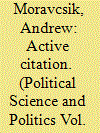

|
|
|
|
|
| Publication |
2010.
|
| Summary/Abstract |
Qualitative research dominates political science. In the field of international relations (IR), for example, about 70% of scholars primarily employ qualitative methods, compared to 21% favoring formal or quantitative analysis (Jordan et al. 2009). Since nearly all of the latter make secondary use of textual and historical methods, overall over 90% of IR scholars employ qualitative analysis, whereas 48% use any statistical and only 12% any formal methods. This understates the dominance of qualitative analysis, for many statistical data sets rest ultimately on historical work, and IR scholars, when polled, report that qualitative case studies are more relevant for policy than quantitative or formal work. Hardly any major IR debate-whether that over the end of the cold war, American unipolarity, Chinese foreign policy, the nature of European integration, compliance with international law, democratic peace, the causes of war, or the impact of human rights norms-remains untouched by important qualitative contributions.
|
|
|
|
|
|
|
|
|
|
|
|
|
|
|
|
| 2 |
ID:
106255
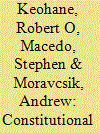

|
|
|
|
|
| Publication |
2011.
|
| Summary/Abstract |
According to our constitutional conception, modern democracy is multidimensional: it incorporates the values of faction control, minority rights protection, and informed deliberation, as well as political accountability. The impact of multilateral organizations (MLOs) on democracy is often not straightforward: it requires careful analysis of how particular MLOs interact with preexisting domestic political institutions within specific issue-areas. Thus we reject the conventional wisdom that MLOs are necessarily democracy-degrading simply because they are not directly participatory. Gartzke and Naoi's critique misstates our views on some fundamental issues. We clarify our analyses of the multidimensional nature of constitutional democracy; the relationship between democracy and multilateralism; the Madisonian distinction between interest groups that support the general interest and those that do not; and our understanding of the current state of research. We suggest possibilities for further elaborating our argument, theoretically and empirically.
|
|
|
|
|
|
|
|
|
|
|
|
|
|
|
|
| 3 |
ID:
090368
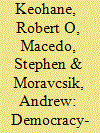

|
|
|
|
|
| Publication |
2009.
|
| Summary/Abstract |
International organizations are widely believed to undermine domestic democracy. Our analysis challenges this conventional wisdom, arguing that multilateral institutions can enhance the quality of national democratic processes, even in well-functioning democracies, in a number of important ways: by restricting the power of special interest factions, protecting individual rights, and improving the quality of democratic deliberation, while also increasing capacities to achieve important public purposes. The article discusses conflicts and complementarities between multilateralism and democracy, outlines a working conception of constitutional democracy, elaborates theoretically the ways in which multilateral institutions can enhance constitutional democracy, and discusses the empirical conditions under which multilateralism is most likely to have net democratic benefits, using contemporary examples to illustrate the analysis. The overall aim is to articulate a set of critical democratic standards appropriate for evaluating and helping to guide the reform of international institutions.
|
|
|
|
|
|
|
|
|
|
|
|
|
|
|
|
| 4 |
ID:
124792
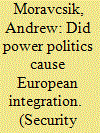

|
|
|
|
|
| Publication |
2013.
|
| Summary/Abstract |
There is much to admire in Sebastian Rosato's Europe United: Power Politics and the Making of the European Community.1 Its core argument exemplifies ambitious, theory-driven scholarship aimed at establishing a revisionist account of European integration in the 1950s, which it generalizes to a monocausally realist theory of regional integration. "The European Community," Rosato argues, "is best understood as an attempt by . . . France and Germany . . . to balance against the Soviet Union and one another."2 Since many have observed that early European integration was influenced by the geopolitical imperative of balancing against the Soviet Union and its Communist allies, this explanation is not intuitively implausible. With much realist writing having degenerated (in the "philosophy of science" sense) into a neoclassical form often indistinguishable from liberal theory, Rosato remains a real realist. At the same time, at his best, as in his discussion of the defeat of the European Defense Community (EDC), he shows himself to be a nuanced historian who recognizes the complex interaction of ideology and geopolitics in bringing about events. Europe United's explicit aim to predict the future means that it has important implications not just for scholars, but for contemporary decision makers and citizens. All this deserves praise.
|
|
|
|
|
|
|
|
|
|
|
|
|
|
|
|
| 5 |
ID:
112340
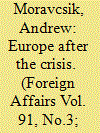

|
|
|
|
|
| Publication |
2012.
|
| Summary/Abstract |
As Europe emerges from economic crisis, a larger challenge remains: finally turning the eurozone into an optimal currency area, with economies similar enough to sustain a single monetary policy. Getting there will be difficult and expensive, but the future of European integration hangs in the balance.
|
|
|
|
|
|
|
|
|
|
|
|
|
|
|
|
| 6 |
ID:
093675
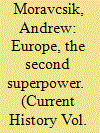

|
|
|
|
|
| Publication |
2010.
|
| Summary/Abstract |
There are, and will remain for the foreseeable future, two global superpowers: the United States and Europe. Only these two actors are consistently able to project a full spectrum of 'smart power' internationally.
|
|
|
|
|
|
|
|
|
|
|
|
|
|
|
|
| 7 |
ID:
073559
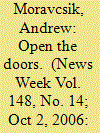

|
|
|
| 8 |
ID:
066212
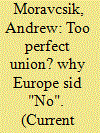

|
|
|
| 9 |
ID:
131530
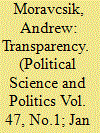

|
|
|
|
|
| Publication |
2014.
|
| Summary/Abstract |
Qualitative political science, the use of textual evidence to reconstruct causal mechanisms across a limited number of cases, is currently undergoing a methodological revolution. Many qualitative scholars-whether they use traditional case-study analysis, analytic narrative, structured focused comparison, counterfactual analysis, process tracing, ethnographic and participant-observation, or other methods-now believe that the richness, rigor, and transparency of qualitative research ought to be fundamentally improved.
|
|
|
|
|
|
|
|
|
|
|
|
|
|
|
|
| 10 |
ID:
136451
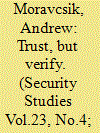

|
|
|
|
|
| Summary/Abstract |
Qualitative analysis is the most important empirical method in the field of international relations (IR). More than 70 percent of all IR scholars conduct primarily qualitative research (including narrative case studies, traditional history, small-n comparison, counterfactual analysis, process-tracing, analytic narrative, ethnography and thick description, discourse analysis), compared to only 20 percent whose work is primarily quantitative. Total use is even more pervasive, with more than 85 percent of IR scholars conducting some qualitative analysis.1 Qualitative analysis is also unmatched in its flexibility and applicability: a textual record exists for almost every major international event in modern world history. Qualitative research also delivers impressive explanatory insight, rigor, and reliability. Of the twenty scholars judged by their colleagues to have “produced the best work in the field of IR in the past 20 years,” seventeen conduct almost exclusively qualitative research.2 Moreover, controlled studies reveal that experts on world affairs whose analyses are informed by more eclectic theory and the myriad “situational facts of each historical episode” (a mode in which qualitative analysis excels) tend to predict future events significantly better than those who seek to predict future events using average tendencies and abstract theory (hallmarks of formal and quantitative analysis). To borrow Tolstoy's famous metaphor, “foxes” consistently outperform “hedgehogs.”3 No wonder scholars hold a widespread conviction that qualitative analysis is more policy relevant than any other type of IR scholarship.
|
|
|
|
|
|
|
|
|
|
|
|
|
|
|
|
|
|
|
|
|